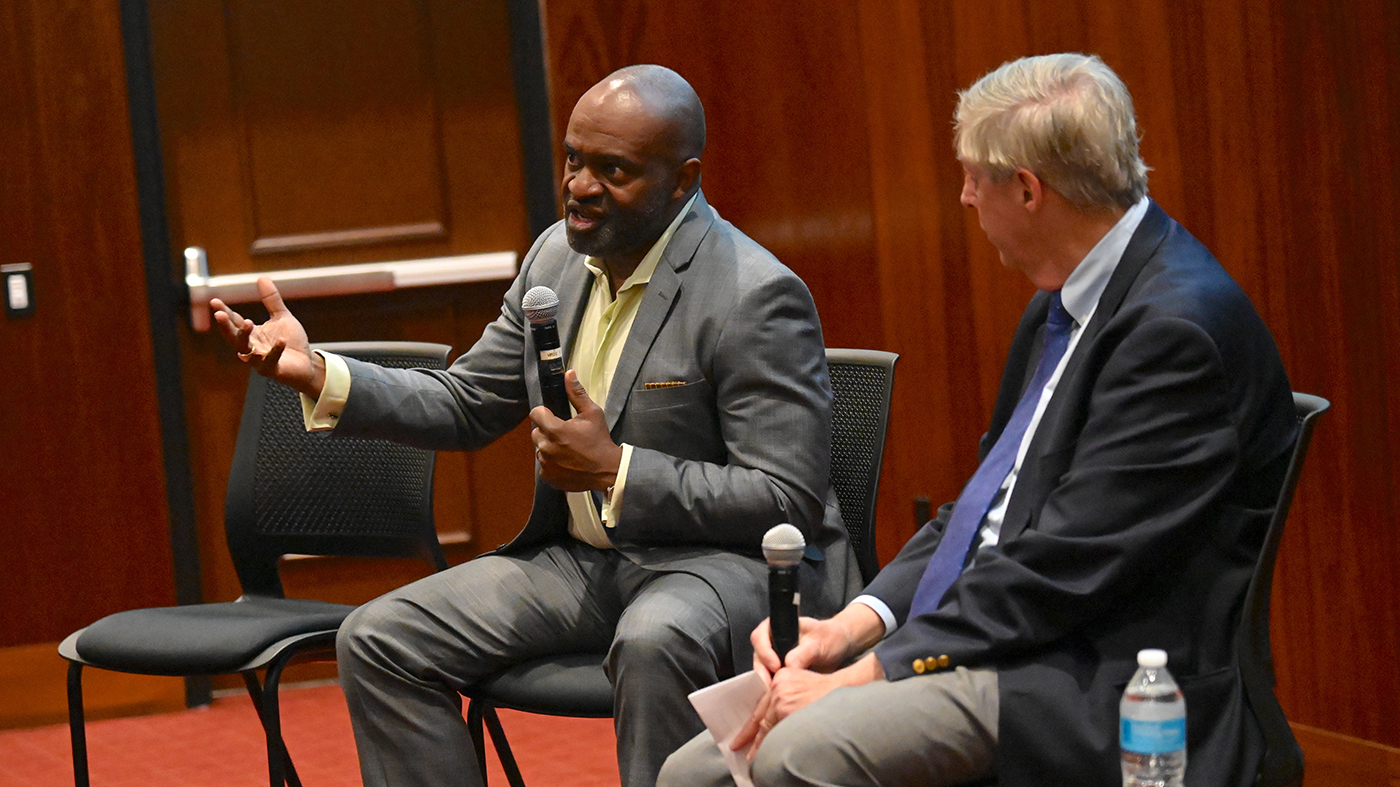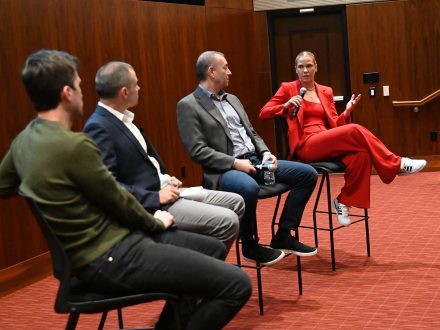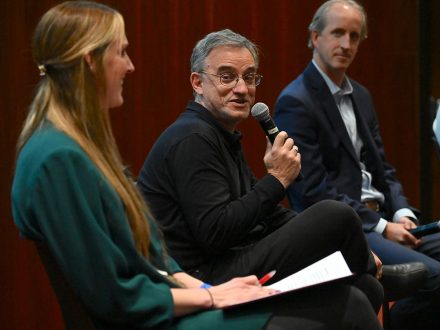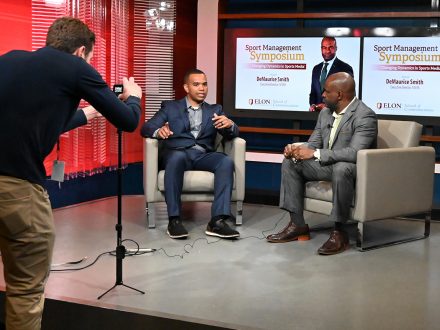The executive director of the NFL Players Association served as the keynote speaker for the 2022 Elon Sport Management Symposium, which delved into the “Changing Dynamics in Sports Media.”

As the leading advocate for the players’ union of America’s most popular sport, DeMaurice Smith has a unique perspective negotiating – and often sparing – with the 32 millionaires who own NFL franchises. The executive director of the NFL Players Association shared his insights on April 20 with more than 125 attendees to kick off the 2022 Elon Sport Management Symposium held in Turner Theatre.
Hosted by the Sport Management Department, the annual symposium addressed the “Changing Dynamics in Sports Media,” inviting Smith, a contingent of media and strategic communications professionals, and a current professional athlete to delve into the evolving sports media landscape, what the future of sports and media industries might look like, and how athletes currently brand themselves.

Smith opened the symposium with an hourlong informal conversation – think fireside chat without the fireplace – with Assistant Professor Bill Squadron. The longtime friends had a candid conversation where Smith offered a glimpse into his 13-year tenure representing NFL players as well as his relationship with NFL owners and Commissioner Roger Goodell.
Click here for our Sport Management Symposium photo gallery.
Among the topics discussed were the NFL’s most recent collective bargaining agreement, the lack of diversity in the league’s coaching ranks, the rise and integration of gambling within the league, student-athletes and their amateur status and how NFL players (and others) market themselves.
Smith made it clear that the NFL does not operate like most industries and, as a result, the players don’t receive the same treatment a normal employee would expect. To hammer home this point, Smith highlighted several issues he has with the NFL Combine, and how little say NFL prospects have in the evaluation and drafting process.
“The league doesn’t operate like a corporation, it operates more like feudal kingdoms – like individual fiefdoms,” Smith said. “The job of the commissioner is to protect them.”
Smith explained that his position is to protect the best interests of the league’s players, both in terms of health and safety, as well as financially. He noted that NFL players don’t have long careers compared to other industries and that players are “100 percent” likely to get injured on the job.
“For most players, the NFL is their first job. We need to teach them to think of it in that way. It’s not a game anymore,” he said. On more than one occasion Smith mentioned the importance of the NFLPA building relationships with players, while also educating them on the hurdles they will encounter as professional athletes.
While the NFL’s current collective bargaining agreement was initially opposed by some players – with the new 17-game schedule being the biggest lightning rod – Smith and others commended the negotiations for serving the best interests of “core players” with higher minimums, expanded rosters and veteran practice-squad spots.

When the conversation turned to the lack of minority head coaches in the league and the recent lawsuit by former Miami Dolphins head coach Brian Flores, Smith had a critical, sharp response.
“Any rule that operates in complete darkness and hasn’t achieved its stated goal is really just a suggestion,” he said, alluding to the Rooney Rule, an NFL policy that requires teams to interview ethnic-minority candidates for head coaching positions.
Smith closed his keynote with questions from the audience. The inquiries addressed his transition from a criminal law attorney to the NFL, his relationships with other player association leaders and the trials and tribulations of leading a union during a global pandemic.
“The pandemic is the first time football bent to another concern instead of everything else bending to football,” Smith said when discussing COVID-19. It was the one time he recalled questioning the importance of the game because the global situation was so dire.
Following Smith’s conversation, the symposium shifted gears to host the first of two panel discussions featuring industry experts from prominent sports media organizations.

Moderated by Associate Professor David Bockino, the “Athlete-Generated Content: Brand Management or Journalism?” panel delved into sports media, how athletes promote their individual brands and the blurring line between traditional journalism and first-person material.
The conversation offered a variety of perspectives with Sean Conboy, editor-in-chief of The Players’ Tribune – a publication written in collaboration with athletes – and Paul Fichtenbaum, chief content officer for The Athletic – an online publication with a more traditional approach to news coverage. Additionally, Merritt Mathias, a member of the North Carolina Courage, a professional women’s soccer team based in Cary, discussed her own opinions on sharing content and building her personal brand.
The symposium concluded with the “Redefining the Reporter-Athlete Relationship: Coverage, Access, and Mental Health” panel, which debated the changing and challenging dynamic between athletes and the individuals who report on them. Assistant Professor Shaina Dabbs moderated the conversation between Ted Keith, assistant managing editor of Sport Business Journal, Lauren Walker, assistant professor of exercise science at Elon University, and Joe Favorito, a sport strategic communications consultant and co-host of “Columbia University Sports Podcast.”
Additionally, several symposium speakers lectured in Sport Management classes during their campus visits. Smith, Fichtenbaum and Favorito all attended separate classes led by Assistant Professor Mark Cryan to discuss their careers and industries. Smith also participated in a 25-minute, on-camera interview with WRAL anchor Chris Lea that will be shared on the Raleigh station’s broadcasts and online platforms.


